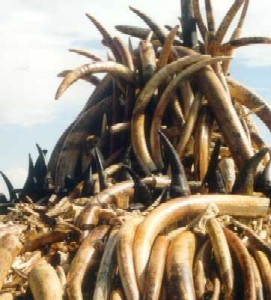Animal rights activists slam South Africa ivory auction
 Pretoria - Animal rights activists and a renowned conservationist on Thursday slammed the sale by South Africa of 51 tonnes of ivory, calling four recent auctions of tusks to Asian buyers "irresponsible" and a "disservice to conservation."
Pretoria - Animal rights activists and a renowned conservationist on Thursday slammed the sale by South Africa of 51 tonnes of ivory, calling four recent auctions of tusks to Asian buyers "irresponsible" and a "disservice to conservation."
The ivory trade has been banned since 1989. However, the 171 members of the UN-backed Convention on International Trade in Endangered Species (CITES) last year gave the go-ahead for the governments of South Africa, Namibia, Zimbabwe and Botswana to sell ivory accumulated in their national parks in one-day sales. The four countries have healthy elephant populations.
Thursday's sale in Pretoria - the last and the biggest of the auctions that began in Namibia on October 28 - got underway after a nearly two-hour delay caused when buyers refused to start bidding in front of the media.
Animal rights groups have objected to the auctions, saying all sales of ivory - even legal - stimulate black market trade in the so- called "white gold" and, consequentially, elephant poaching.
Renowned Kenyan conservationist Richard Leakey said in a statement he believed auctioning off ivory would fuel poaching "particularly in the central, eastern and western African elephant range states, where poaching is not yet properly controlled."
Last year, some African countries, such as Kenya and Mali, had objected to the sales.
Leakey accused CITES of failing to protect endangered species and of being beholden to "partisan interests."
The United States-based International Fund for Animal Welfare (IFAW) released a statement saying the sale of an "exorbitant amount of ivory to flood the market" was just "plain irresponsible" and would increase illegal hunting activities.
The sale takes place nearly a decade after the last permitted sale of ivory in the region, in 1999.
Dozens of journalists were ordered out of the room at the Reserve Bank in Pretoria after about two dozen Chinese and Japanese traders objected to the public knowing how much they purchased. The other three auctions also took place behind closed doors.
The ivory itself was not on show. Images of the tusks, which are being stored in Kruger National Park and sold in lots, were displayed on a big screen.
Ivory is used mainly in carved ornaments, including dagger handles, and is particularly popular in Asia.
Where elephants were killed for their tusks, park rangers also often lost their lives trying to protect them, IFAW said.
"The situation is very clear: more ivory in the marketplace equals more dead elephants - and rangers," Wamithi said.
Both IFAW and Leakey also took exception to the origin of the buyers.
Traders from China and Japan were the only two groups CITES approved to buy the ivory. IFAW protested the choice, arguing that they are "among the world's largest illegal ivory markets." Raw unworked ivory sells for upwards of 850 dollars a kilogramme in Asia, according to IFAW.
Leakey also complained that China had a bad track record on controlling the illegal ivory trade.
Defending the auctions, the South African government said the four countries involved in the auctions have over 312,000 elephants and that those populations were increasing.
CITES has stipulated that the proceeds from the ivory be put towards wildlife management and community development.
In total, 108 tonnes of ivory, harvested mainly from elephants that died accidentally or of natural causes in national parks, went on the auction block over the past two weeks.
The 55 tonnes sold in Zimbabwe, Namibia and Botswana through Thursday sold for around 7 million dollars, around 127 dollars per kilogramme.
Of the 51 tonnes for sale in Pretoria, 46 tonnes comes from the world-famous Kruger National Park.
Of this stock, local media reported that some was from elephants culled before 1994, when the practice was allowed to control the pachyderm population. South Africa only last year relaxed a 13-year moratorium on the practise, allowing culling as a measure of last resort.
After Thursday's sale is over, the trade will have to wait at least another nine years before CITES says it can envisage another sale. (dpa)